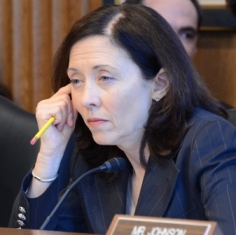WASHINGTON D.C. –
On Wednesday, Chairwoman Maria Cantwell (D-WA) held a U.S. Senate Committee on Indian Affairs oversight hearing to address housing and infrastructure needs in Tribal communities and to discuss the reauthorization of the Native American Housing Assistance and Self-Determination Act (NAHASDA). Wednesday’s hearing – entitled “Identifying Barriers to Indian Housing Development and Finding Solutions” – marked the first oversight hearing by the Senate Committee on Indian Affairs during the 113th Congress.
 During the hearing, Cantwell called for reauthorization of NAHASDA, the critical Tribal housing bill that is scheduled to expire in September 2013. NAHASDA was last reauthorized in 2008 for five years.
During the hearing, Cantwell called for reauthorization of NAHASDA, the critical Tribal housing bill that is scheduled to expire in September 2013. NAHASDA was last reauthorized in 2008 for five years.
“Since the Native American Housing Assistance and Self-Determination Act was implemented in 1998, 31,000 Indian families now live in newly constructed housing units, and another 64,500 Indian families have been able to rehabilitate their homes through the Indian Housing Block Grant program,” Cantwell said. “This hearing begins the reauthorization process, as the Committee works to address housing challenges to ensure that all Tribal members have access to safe and affordable housing and that housing programs are meeting the needs of tribal members, now and into the future.”
The Committee heard testimony from the Department of Housing and Urban Development, the National American Indian Housing Council, and three Tribal housing Directors.
Witnesses at the hearing echoed the need to streamline housing programs under the federal structure, during NAHASDA reauthorization. They described the challenges posed by the fact that multiple agencies are often involved in the development of a single housing unit in Indian Country. Multi-agency requirements can be redundant, leading to delays in housing delivery to Indian communities. In addition, cumbersome regulations do not allow for technological advancements in energy-efficient housing and other innovative approaches.
The Committee also heard testimony from Annette Bryan, Executive Director of the Puyallup Nation Housing Authority in Washington state. “NAHASDA represents great progress toward the goal of self-determination and has provided tribes and tribal housing authorities with important tools for meeting the vast housing needs in Indian Country,” Bryan said. “Tribes need the flexibility to identify and target our local needs, including advancement in green housing, and we look forward to working with the Committee on the best ways to address these issues.”
In addition to Ms. Bryan, the Committee heard from Russell Sossamon, Executive Director of the Choctaw Nation Housing Authority in Oklahoma: “The reauthorization should maintain the government-to-government relationship between tribes and the federal government,” Sossamon said. The timely reauthorization of NAHASDA should be one of Congress’ top priorities before the end of this fiscal year.”
In 1996, Congress first passed NAHASDA to better meet the needs of Tribal governments and to acknowledge that Tribes, through self-determination, are best suited to determine and meet the needs of their members. NAHASDA replaced funding under the 1937 Housing Act with Indian Housing Block Grants and provided tribes with the choice of administering the block grant themselves or through their existing Indian Housing Authorities or their tribally-designated housing entities. In 2002, NAHASDA was reauthorized for five years, and was again reauthorized in 2008 for a five-year period which expires in September 2013.
###
Contact: Press Office
Contact Phone: 202-224-8277
